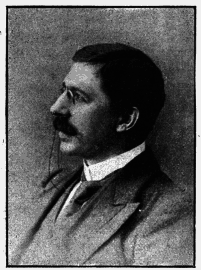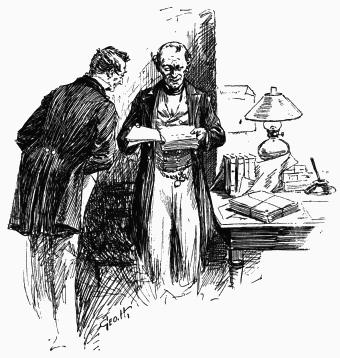My next try was at a joint story—a story written by three girls, myself and two friends. That was in the same year. We really made considerable headway with that story; and had visions of completely finishing it and getting no less a sum than thirty pounds for it. I have a sort of an idea that I supplied most of the framework for the story, and that the elder of my collaborators filled in the millinery and the love-making.
But—alas for the futility of human hopes and desires!—that book was destined never to be finished, for I had a violent quarrel with my collaborators, and we have never spoken to each other from that day to this.
So came to an untimely end my second serious attempt at writing a book; for the stories that I had written in emulation of Josephine H—— were only short ones, and were mostly unfinished.
I wasted a terrible deal of paper between my second try and my seventeenth birthday, and I believe that I was, at that time, one of the most hopeless trials of my father's life. He many times offered to provide me with as much cheap paper as I liked to have; but cheap paper did not satisfy my artistic soul, for I always liked the best of everything. Good paper was my weakness—as it was his—and I used it, or wasted it, which you will, with just the same lavish hand as I had done aforetime.
When I was seventeen, I did a skit on a little book called 'How to Live on Sixpence a Day.' It was my first soldier story—excepting the original three soldiers and a pig—and introduced the 'sixpence a day' pamphlet into a smart cavalry regiment, whose officers were in various degrees of debt and difficulty, and every man was a barefaced portrait, without the smallest attempt at concealment of his identity. Eventually this sketch was printed in a York paper, and the honour of seeing myself in print was considered enough reward for me. I, on the contrary, had no such pure love of fame. I had done what I considered a very smart sketch, and I thought it well worth payment of some kind, which it certainly was.
After this, I spent a year abroad, improving my mind—and I think, on the whole, it will be best to draw a veil over that portion of my literary history, for I went out to dinner on every possible occasion, and had a good time generally. Stay—did I not say my literary history? Well, that year had a good deal to do with my literary history, for I wrote stories most of the time, during a large part of my working hours and during the whole of my spare time, when I did not happen to be going out to dinner. And when I came home, I worked on just the same until, towards the end of '75, I drew blood for the first time. Oh, the joy of that first bit of money—my first earnings! And it was but a bit, a mere scrap. To be explicit, it amounted to ten shillings. I went and bought a watch on the strength of it—not a very costly affair; a matter of two pounds ten and an old silver turnip that I had by me. It was wonderful how that one half-sovereign opened up my ideas. I looked into the future as far as eye could see, and I saw myself earning an income—for at that time of day I had acquired no artistic feelings at all, and I genuinely wanted to make name and fame and money—I saw myself a young woman who could make a couple of hundred pounds from one novel, and I gloried in the prospect.

I disposed of a good many stories in the same quarter at starvation prices, ranging from the original ten shillings to thirty-five. Then, after a patient year of this not very luxurious work, I made a step forward and got a story accepted by the dear old Family Herald. Oh, yes, this is really all relevant to my first book; very much so, indeed, for it was through Mr. William Stevens, one of the proprietors of the Family Herald, that I learned to know the meaning of the word 'caution'—a word absolutely indispensable to any young author's vocabulary.
At this time I wrote a great deal for the Family Herald, and also for various magazines, including London Society. In the latter, my first 'Winter' work appeared—a story called 'A Regimental Martyr.'
I was very oddly placed at this point of my career, for I liked most doing the 'Winter' work, but the ordinary young-lady-like fiction paid me so much the best, that I could not afford to give it up. I was, like all young magazine writers, passionately desirous of appearing in book form. I knew not a single soul in the way connected with literary matters, had absolutely no help or interest of any kind to aid me over the rough places, or even of whom to ask advice in times of doubt and difficulty. Mr. William Stevens was the only editor that I knew to whom I could go and say, 'Is this right?' or 'Is that wrong?' And I think it may be interesting to say here that I have never asked for, or indeed used, a letter of introduction in my life—that is, in connection with any literary business.
Well, when I had been hard at work for several years, I wrote a very long book—upon my word, in spite of my good memory, I forget what it was called. The story, however, lives in my mind well enough; it was the story of a very large family—about ten girls and boys, who all made brilliant marriages and lived a sort of shabby, idyllic, happy life, somewhat on the plan of 'God for us all and the devil take the hindermost.' Need I say that it was told in the first person and in the present tense, and that the heroine was anything but good-looking?
I was very young then, and thought a great deal of my pretty bits of writing and those seductive scraps of moralising, against which Mr. Stevens was always warning me. Well, this very long, not to say spun-out, account of this very large family of boys and girls, did not happen to please the 'readers' for the Family Herald—then my stay-by—so I thought I would have a try round the various publishers and see if I could not get it brought out in three volumes. Of course, I tried all the best people first, and very often, when I receive from struggling young authors (who know a great deal more about my past history than I do myself, and who frequently write to ask me the best and easiest way to get on at novel-writing, without either hard work, or waiting, or disappointment, because, if you please, my own beginnings were so singularly successful and delightful) the information that I have never known of any of their troubles, it seems to me that my past and my present cannot be the past and present of the same woman. Yet they are. I went through it all; the same sickening disappointments, the same hopes and fears; I trod the self-same path that every beginner must assuredly tread, as we must all in time tread that other path to the grave. I went through it all, and with that exceedingly long and detailed account of that large and shabby family, I trod the thorny path of publishing almost to the bitter end—ay, even to the goal where we find the full-blown swindler waiting for us, with bland looks and honeyed words of sweetest flattery. Dear, dear! many who read this will know the process. It seldom varies. First, I sent my carefully written MS., whose very handwriting betrayed my youth, to a certain firm which had offices off the Strand, to be considered for publication. The firm very kindly did consider it, and their consideration was such that they made me an offer of publication—on certain terms.

Their polite note informed me that their readers had read the work and thought very highly of it, that they were inclined—just by the way of completing their list for the approaching September, the best month in the year for bringing out novels—to bring it out, although I was, as yet, unknown to fame. Then came the first hint of 'the consideration,' which took the form of a hundred pounds, to be paid down in three sums, all to fall due before the day of publication. I worked out the profits which could accrue if the entire edition sold out I found that, in that case, I should have a nice little sum for myself of 180l. Now, no struggling young author in his or her senses is silly enough to throw away the chance of making 180l. in one lump. I thought, and I thought the whole scheme out, and I must confess that the more I thought about it, the more utterly tempting did the offer seem. To risk 100%—and to make 180%! Why, it was a positive sin to lose such a chance. Therefore, I scraped a hundred pounds together, and, with my mother, set off for London, feeling that, at last, I was going to conquer the world. We did a theatre on the strength of my coming good fortune, and the morning after our arrival in town set off—in my case, at all events—with swelling hearts, to keep the appointment with the kindly publisher who was going to put me in the way of making fame and fortune.
11
From a photograph by Frances Browne, 135 Regent Street, W.